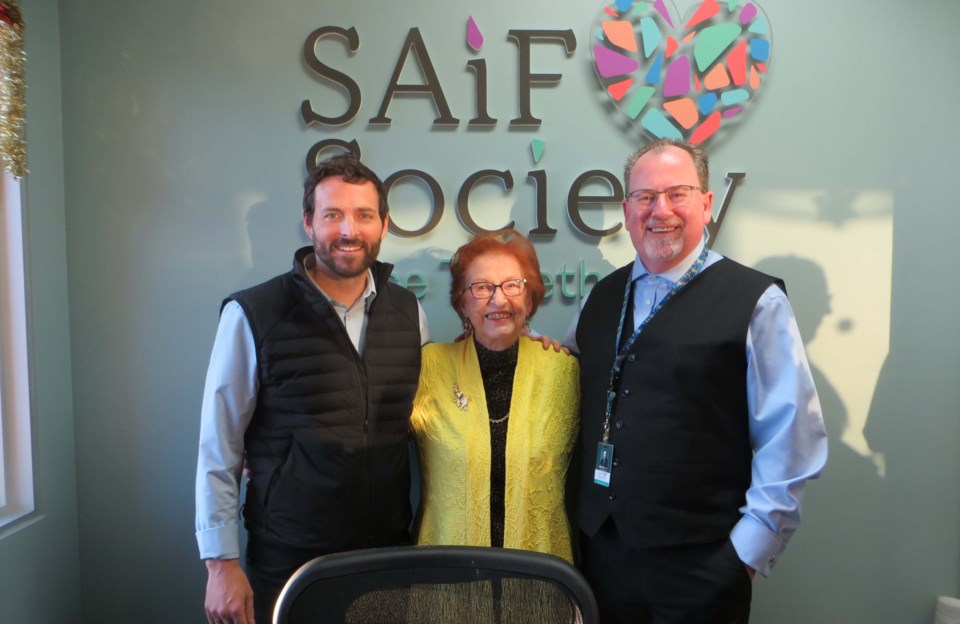Stop Abuse in Families (SAiF) is a slogan easier said than done. However, St. Albert’s SAiF Society has moved one step closer to improving healthier dynamics for families in abusive situations.
The society, which operates at an undisclosed location for privacy reasons, hosted an open house on Tuesday, Nov. 28. Within the past six months, the organization has upgraded to a 2,400-square-foot renovated office better able to serve both clients and staff. The previous SAiF office was a cramped 900 square foot plus space in Campbell Park.
St. Albert Mayor Cathy Heron and retired executive director and SAiF founder, Ireen Slater, conducted the brief unveiling ceremony.
“It’s the biggest joy you can have for any Christmas,” said Slater, currently a spry 91-year-old. Like thousands of women across the country, Slater experienced the devastating physical, emotional, psychological and financial consequences of family abuse. And it was her personal experience and education as a social worker that prompted SAiF.
“I am thrilled. The new facility is more conducive to what is needed. It’s more private and doesn’t blare out what it is. It’s more secure and comfortable for staff and for clients who attend. Mark Dixon is a wonderful add-on as the executive director and Thomas Holmes as board chair is a psychologist who understands the issues and what is important.”
The current space has five offices for meeting clients decorated in calming greens and blues. There is also a large boardroom for group meetings, and large windows filter natural light.
“We have a break room that allows self-care for our clinicians. They see more complex cases and when they see clients, they need to self-care so they don’t take their work home with them,” said Dixon.
So far this year, eight part-time psychologists and counsellors have dealt with 939 phone calls, 192 phone consultations, 170 adult course sessions, 36 child course sessions and 25 youth sessions.
“The numbers are deceiving. The demand is much higher. When we deal with children we need consent from both parents and it isn’t always available,” said Dixon. “But we have an amazing team. If they have an opportunity to speak with parents, they say it’s more about supporting the child instead of placing blame. We’re not here to talk to the child about the parent. We are here to talk to the child about the child.”
Dr. Marci Gordeyko, a registered psychologist and SAiF clinical supervisor, has a personal interest in developing programs for families and children.
“We saw a shift with COVID. Children and youth didn’t have as much participation in schools. That stalled referrals from schools. We’re still trying to update the referrals and the added stressors from COVID,” said Gordeyko.
In moving forward, SAiF plans to expand the Family Therapy Program. Clinicians are seeing more problematic sexual behaviour in youth. It is explained as youth exhibiting behaviour that is abnormal for their stage of development. There is no one-size-fits-all solution and often necessitates different approaches depending on the situation.
“The epicentre for studies on this type of behaviour is the University of Oklahoma. They have an efficacy rate of 97-98 per cent. It’s made a huge impact, and we’d like to send four people down. They go for three, three-day sessions. It’s very intensive. It’s a unique program in children’s services,” said Dixon adding the total estimated cost is $20,000.
For Slater simply hearing about the variety of programs offered to families is heartening. When she approached the St. Albert Catholic Society about starting a program on Feb. 10, 1988, it was gung-ho to take on a new project. Service groups such as the Lions, Kinsmen and Knights of Columbus were also supportive.
“The challenges were trying to teach people the issues and get the funding. I did get wonderful support from people in St. Albert. But it took a while to teach the issues. It was more secret at the time. It was at times difficult to get the parents and school to understand the issues. Some police didn’t understand the issues. We had several wives of police officers who came for help. It took a while for different groups and different people to understand the issues and how they can help,” Slater said.
But by addressing the root causes and working with families, SAiF’s main goal is to foster healthier lives.
Dixon closed by saying, “I’m so thrilled. It’s been so much, but we’re heading in the right direction. It feels right. Just look at the faces of the team, and I can see we’ll continue to do the difficult tasks of much-needed work.”




